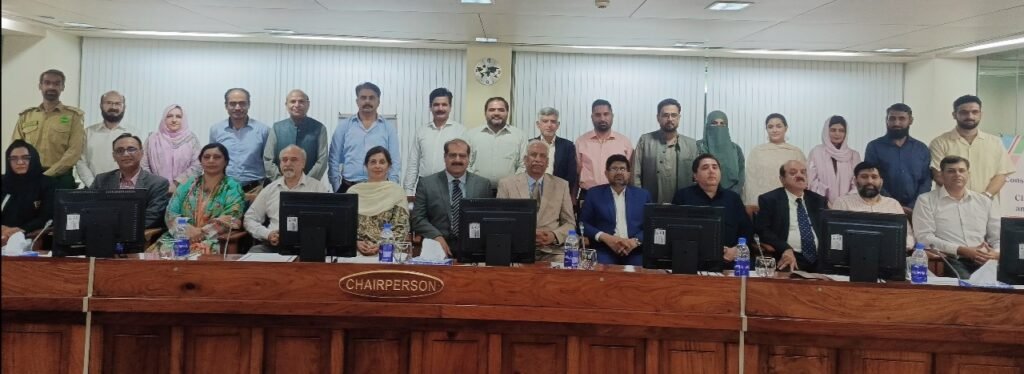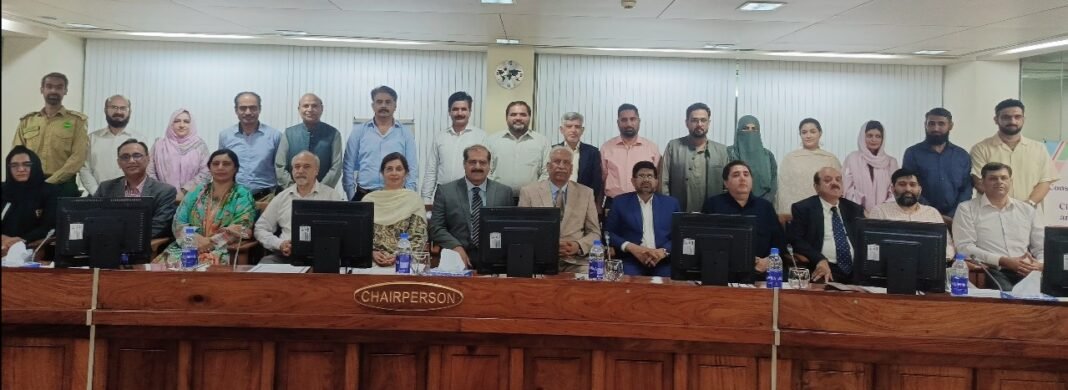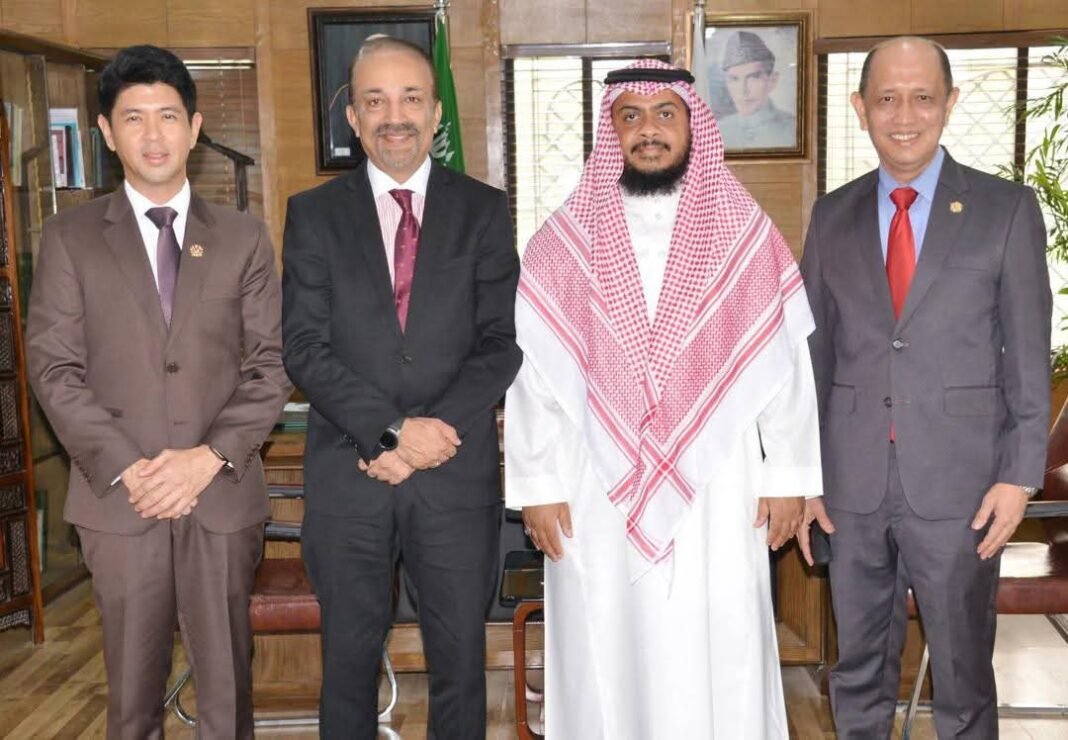
ISLAMABAD : — Speakers at a high-level consultative meeting have underscored the need for multisectoral coordination to address Pakistan’s rising health challenges linked to climate change, pollution, and environmental degradation.
The meeting, held at COMSTECH’s conference room and organised by the Health Services Academy (Ministry of National Health Services, Regulations & Coordination) in collaboration with the Ministry of Climate Change and Environmental Coordination (MoCC&EC), aimed to advance the One Health Workforce Development agenda for pandemic preparedness in Pakistan.
Participants included national and international experts from the World Health Organisation (WHO), UN Food and Agriculture Organisation (FAO), Asian Development Bank (ADB), World Bank, WWF-Pakistan, and others. Stakeholders from the health, environment, wildlife, climate, and development sectors discussed integrated approaches to environmental health and pandemic readiness under the One Health framework.
The session began with welcome remarks by Prof. Dr. Junaid Sarfraz, Rector and Director (Academic) of HSA, on behalf of Prof. Dr. Shahzad Ali Khan, Vice Chancellor. Dr. Tariq Mahmood Ali, National Coordinator of the One Health Project, presented an overview of the initiative’s objectives and expected outcomes.
Keynote speakers Federal Parliamentary Secretary for Health Dr. Nelson Azeem, Dr. Syed Mursalin (Pakistan One Health Alliance), Muhammad Asif Sahibzada (Director General Environment at Ministry of Climate Change & Environmental Coordination), Dr. Shabana Saleem (Director General Health, Ministry of National Health Services, Regulation and Coordination) highlighted the critical need for a viable unified national strategy to tackle the growing convergence of public health and climate risks.
Speaking as a keynote speaker at the event, the Federal Parliamentary Secretary Dr. Nelson Azeem stressed that Pakistan must adopt the One Health approach as a strategic, cross-sectoral response mechanism to protect people, animals, and ecosystems. “We must reaffirm our collective commitment to the One Health Pakistan initiative. The challenges we face are interlinked, and so must be our response,” he said.
In his keynote address, Director General of the Ministry of Climate Change and Environmental Coordination (MOCC&EC), Muhammad Asif Sahibzada warned that unchecked pollution, climate change, and biodiversity loss are driving a surge in zoonotic diseases and antimicrobial resistance. He cautioned that weak institutional coordination could hamper early warning systems and hinder effective responses.
“There is a pressing need to institutionalise the One Health framework across all levels of government. This requires strong policy enforcement, cross-sectoral training, and community engagement to build national resilience,” he said.
Dr. Tariq Mahmood Ali echoed the call, stating: “Pakistan can no longer afford to treat human, animal, and environmental health in isolation. We must work together under a unified platform.”
Muhammad Azim Khoso, Director (Urban Affairs) at MoCC&EC, proposed the establishment of dedicated One Health Units within federal and provincial departments. He said these units, funded through the provincial Annual Development Plans (ADPs), Federal Public Sector Development Programme (PSDP) or international pandemic funds, could offer real-time data on disease outbreaks driven by climate and environmental factors. He suggested these provincial units be linked through a federal interface to ensure swift responses and global reporting.
Muhammad Saleem Shaikh, Deputy Director and environmental advocacy expert at the Ministry of Climate Change and Environmental Coordination (MoCC&EC), has outlined a strategic roadmap to strengthen stakeholder engagement and advocacy across the climate, health, and environmental sectors under the One Health Pakistan initiative.
The senior MoCC&EC official Saleem Shaikh stressed the importance of identifying key stakeholders, including policymakers, healthcare professionals, community leaders, and vulnerable groups, and building trust through consistent communication, advocacy and collaborative engagement with them. He further recommended conducting a comprehensive needs assessment to better understand stakeholders’ advocacy, education and awareness needs and priorities in the context of climate-induced health risks.
“For the One Health initiative to succeed, advocacy efforts must be guided by clearly defined SMART goals, a targeted strategy, and capacity building through specialised training,” he said. Shaikh also highlighted the role of digital and traditional media, social media influencers and community leaders in mobilising public support for One Health agenda in Pakistan and raising awareness about it. Strengthened outreach, he added, is essential for ensuring the initiative translates into meaningful action on the ground.
Earlier, the technical session, chaired by MoCC&EC’s Director General Asif Sahibzada, focused on workforce training, inter-agency coordination and policy innovation. International organisations, including WHO, FAO, ADB, World Bank and WWF-Pakistan, shared actionable recommendations to drive the One Health agenda forward.
Participants reaffirmed their commitment to turning these deliberations into concrete steps toward a healthier, more resilient future for Pakistan, recognizing that the country’s ability to respond to future pandemics is deeply intertwined with environmental health and climate resilience.
The meeting concluded with a shared commitment of working together at all levels to transform the dialogue into concrete action by investing in integrated surveillance systems and climate-resilient health planning — affirming One Health Pakistan as a national imperative.
Sohail Majeed is a Special Correspondent at The Diplomatic Insight. He has twelve plus years of experience in journalism & reporting. He covers International Affairs, Diplomacy, UN, Sports, Climate Change, Economy, Technology, and Health.






![logo-1[1]](https://globalnewspakistan.com/wp-content/uploads/2025/01/logo-11-e1737618310315-300x187.png)